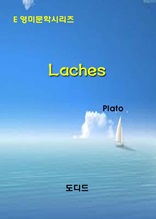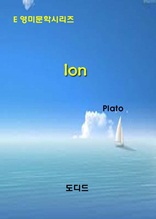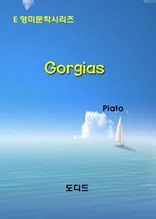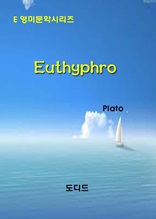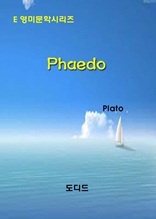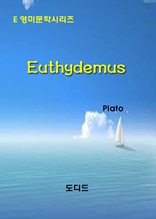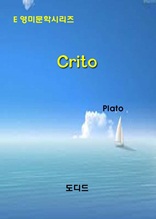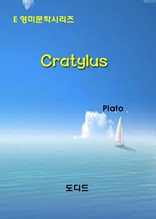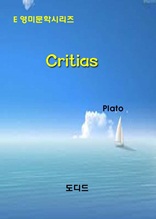Laches
도서정보 : Plato | 2014-03-17 | EPUB파일
지원기기 : PC / Android / iOS
The Laches (Greek Λ?χη?) is a Socratic dialogue written by Plato. Participants in the discourse present competing definitions of the concept of courage.
구매가격 : 1,000 원
Ion
도서정보 : Plato | 2014-03-17 | EPUB파일
지원기기 : PC / Android / iOS
PERSONS OF THE DIALOGUE Socrates Ion. Socrates Welcome Ion. Are you from your native city of Ephesus? Ion No Socrates but from Epidaurus where I attended the festival of Asclepius. Soc. And do the Epidaurians have contests of rhapsodes at the festival? Ion O yes and of all sorts of musical performers. Soc. And were you one of the competitors--and did you succeed? Ion I obtained the first prize of all Socrates. Soc. Well done and I hope that you will do the same for us at the Panathenaea. Ion And I will please heaven.
구매가격 : 500 원
Gorgias
도서정보 : Plato | 2014-03-17 | EPUB파일
지원기기 : PC / Android / iOS
Gorgias the last dialogue Plato wrote before leaving Athens features Socrates views on the sophist-philosopher debate that then raged throughout ancient Athens. In his discussion with Gorgias Polus and Callicles Socrates asserts the existence of a transcendental perfect knowledge and rejects rhetoric as the perversion of dialectic which harms the soul by creating false belief.
구매가격 : 1,000 원
Euthyphro
도서정보 : Plato | 2014-03-17 | EPUB파일
지원기기 : PC / Android / iOS
This Euthyphro and Socrates are represented as meeting in the porch of the King Archon. (Cp. Theaet. sub fin.) Both have legal business in hand. Socrates is defendant in a suit for impiety which Meletus has brought against him (it is remarked by the way that he is not a likely man himself to have brought a suit against another) and Euthyphro too is plaintiff in an action for murder which he has brought against his own father. The latter has originated in the following manner ?A poor dependant of the family had slain one of their domestic slaves in Naxos. The guilty person was bound and thrown into a ditch by the command of Euthyphro’s father who sent to the interpreters of religion at Athens to ask what should be done with him. Before the messenger came back the criminal had died from hunger and exposure.
구매가격 : 1,000 원
Phaedo
도서정보 : Plato | 2014-03-17 | EPUB파일
지원기기 : PC / Android / iOS
After an interval of some months or years and at Phlius a town of Peloponnesus the tale of the last hours of Socrates is narrated to Echecrates and other Phliasians by Phaedo the ‘beloved disciple.’ The Dialogue necessarily takes the form of a narrative because Socrates has to be described acting as well as speaking. The minutest particulars of the event are interesting to distant friends and the narrator has an equal interest in them. During the voyage of the sacred ship to and from Delos which has occupied thirty days the execution of Socrates has been deferred. (Cp. Xen. Mem. iv. 8. 2.) The time has been passed by him in conversation with a select company of disciples. But now the holy season is over and the disciples meet earlier than usual in order that they may converse with Socrates for the last time. Those who were present and those who might have been expected to be present are mentioned by name. There are Simmias and Cebes (Crito 45 B) two disciples of Philolaus whom Socrates ‘by his enchantments has attracted from Thebes’ (Mem. iii. 11. 17) Crito the aged friend the attendant of the prison who is as good as a friend?these take part in the conversation. There are present also Hermogenes from whom Xenophon derived his information about the trial of Socrates (Mem. iv. 8. 4) the ‘madman’ Apollodorus (Symp. 173 D) Euclid and Terpsion from Megara (cp. Theaet. sub init.) Ctesippus Antisthenes Menexenus and some other less-known members of the Socratic circle all of whom are silent auditors. Aristippus Cleombrotus and Plato are noted as absent. Almost as soon as the friends of Socrates enter the prison Xanthipp? and her children are sent home in the care of one of Crito’s servants. Socrates himself has just been released from chains and is led by this circumstance to make the natural remark that ‘pleasure follows pain.’ (Observe that Plato is preparing the way for his doctrine of the alternation of opposites.) ‘Aesop would have represented them in a fable as a two-headed creature of the gods.’ The mention of Aesop reminds Cebes of a question which had been asked by Evenus the poet (cp. Apol. 20 A) ‘Why Socrates who was not a poet while in prison had been putting Aesop into verse?’?‘Because several times in his life he had been warned in dreams that he should practise music and as he was about to die and was not certain of what was meant he wished to fulfil the admonition in the letter as well as in the spirit by writing verses as well as by cultivating philosophy. Tell this to Evenus and say that I would have him follow me in death.’ ‘He is not at all the sort of man to comply with your request Socrates.’ ‘Why is he not a philosopher?’ ‘Yes.’ ‘Then he will be willing to die although he will not take his own life for that is held to be unlawful.’
구매가격 : 1,000 원
라스트 런어웨이
도서정보 : 트레이시 슈발리에 역자 : 이나경 | 2014-03-17 | EPUB파일
지원기기 : PC / Android / iOS
1997년에 데뷔, 오늘날 세계적인 작가의 반열에 오른 트레이시 슈발리에의 2013년 작. 처음으로 모국인 미국의 역사를 소재로 한 장편소설로, 작가로서의 전환점을 이룬 작품이다. 저자는 2009년 4월, 노벨상 수상작가 토니 모리슨의 '19세기 지하철도 운동'에 대한 연설을 듣고 이 소설의 영감을 얻었다고 밝히고 있다.
이후 4년간 19세기 미국 오하이오의 시대상에 대한 면밀한 역사적 고증 작업을 통해 소설의 입체성을 완벽하게 구현했다. 미국 중서부 초기 개척자들의 삶을 면밀하고 섬세하게 관찰하여 각 등장인물들에게 각기 다른 개성을 부여하면서 1850년대 퀘이커 교도들과 도망 노예들의 이야기를 감동적으로 재현했다. 출간 이후 언론과 문단의 호평을 받았다.
영국 퀘이커 교도인 아너 브라이트는 1850년 영국 도싯(Dorset)에서 미국 오하이오로 항해를 나선다. 약혼했던 남자가 파혼을 선언하면서 마음의 상처를 깊이 입은 아너 브라이트는 언니 그레이스가 미국에 있는 약혼자와 결혼하기 위해 떠난다는 소식을 듣고, 갑작스레 언니와 동행하기로 결정한다.
하지만 한 달여의 항해로 인한 뱃멀미로 시달리고, 마차를 타고 미국 대륙을 건너는 도중 언니 그레이스는 황열병에 걸려 시름시름 앓다가 낯선 땅에서 죽음을 맞이한다. 홀로 남게 된 아너는 언니의 약혼자에게 불운의 소식을 전하기 위해 오하이오 주 페이스웰로 기나긴 여정을 계속한다.
구매가격 : 11,040 원
Euthydemus
도서정보 : Plato | 2014-03-14 | EPUB파일
지원기기 : PC / Android / iOS
The Euthydemus though apt to be regarded by us only as an elaborate jest has also a very serious purpose. It may fairly claim to be the oldest treatise on logic for that science originates in the misunderstandings which necessarily accompany the first efforts of speculation. Several of the fallacies which are satirized in it reappear in the Sophistici Elenchi of Aristotle and are retained at the end of our manuals of logic. But if the order of history were followed they should be placed not at the end but at the beginning of them for they belong to the age in which the human mind was first making the attempt to distinguish thought from sense and to separate the universal from the particular or individual. How to put together words or ideas how to escape ambiguities in the meaning of terms or in the structure of propositions how to resist the fixed impression of an eternal being or perpetual flux how to distinguish between words and things?these were problems not easy of solution in the infancy of philosophy. They presented the same kind of difficulty to the half- educated man which spelling or arithmetic do to the mind of a child. It was long before the new world of ideas which had been sought after with such passionate yearning was set in order and made ready for use. To us the fallacies which arise in the pre-Socratic philosophy are trivial and obsolete because we are no longer liable to fall into the errors which are expressed by them. The intellectual world has become better assured to us and we are less likely to be imposed upon by illusions of words.
구매가격 : 1,000 원
Crito
도서정보 : Plato | 2014-03-14 | EPUB파일
지원기기 : PC / Android / iOS
The Crito seems intended to exhibit the character of Socrates in one light only not as the philosopher fulfilling a divine mission and trusting in the will of heaven but simply as the good citizen who having been unjustly condemned is willing to give up his life in obedience to the laws of the state...
구매가격 : 500 원
Cratylus
도서정보 : Plato | 2014-03-14 | EPUB파일
지원기기 : PC / Android / iOS
Cratylus (Κρατ?λο?) is the name of a dialogue by Plato written in approximately 360 BC. In the dialogue Socrates is asked by two men Cratylus and Hermogenes to tell them whether names are "conventional" or "natural" that is whether language is a system of arbitrary signs or whether words have an intrinsic relation to the things they signify. In doing this Cratylus became one of the earliest philosophical texts of the Classical Greek period to deal with matters of etymology and linguistics.
구매가격 : 1,000 원
Critias
도서정보 : Plato | 2014-03-14 | EPUB파일
지원기기 : PC / Android / iOS
Plato s dialogue here marks the first recorded mention of the legend of Atlantis though scholars continue to debate whether he meant it as an allegory or historical narrative. It is a dialogue between the politicians Critias and Hermocrates with the philosophers Socrates and Timaeus.
구매가격 : 500 원

